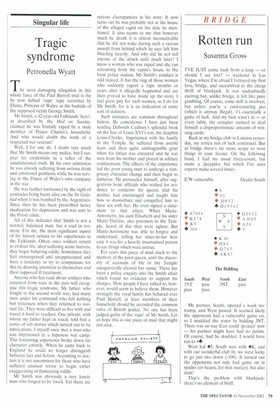Tragic syndrome
Petronella Wyatt
The most damaging allegation in this whole farce of the Paul Burrell trial is the by now fabled 'rape' tape recorded by Diana, Princess of Wales, at the bedside of the supposed victim George Smith.
Mr Smith, a 42-year-old Falklands 'hero', as described by the Mail on Sunday, claimed he was brutally raped by a male member of Prince Charles's household. And who would doubt the work of a respected war veteran?
Well, I for one do. I doubt very much that Mr Smith means any malice, but I suspect his credentials as a teller of the unadulterated truth. By his own admission he was already suffering from serious drink and emotional problems while he was serving in the Prince of Wales's own company in the war.
He was further tormented by the sight of comrades being burnt alive on the Sir Galahad when it was bombed by the Argentines. Since then he has been prescribed heavy medication for depression and was sent to the Priory clinic.
All of this indicates that Smith is not a normal, balanced man, but a soul in torment. For me. the most significant aspect of his history relates to his experiences in the Falklands. Often, once soldiers return to civilian life, after suffering acute horrors, they begin behaving oddly. Sometimes they feel unrecognised and unappreciated and have a tendency to try to compensate for this by drawing attention to themselves and their supposed ill treatment.
Anyone who has read about soldiers who returned from wars in the past will recognise this tragic syndrome. My father, who fought in the second world war, had many men under his command who felt nothing but bitterness when they returned to normal life. They were difficult to live with and found it hard to readjust. One private, with whom my father kept in touch, told him a series of sob stories which turned out to be fabrications. I myself once met a man who was imprisoned in a Japanese war camp. This harrowing experience broke down his character entirely. When he came back to England he could no longer distinguish between fact and fiction. According to doctors it is not uncommon for those who have suffered unusual terror to begin either exaggerating or fantasising wildly.
Mr Smith was obviously a very lonely man who longed to be loved. Yet there are serious discrepancies in his story. It now turns out he was probably not at the house of the alleged rapist on the date he mentioned. It also seems to me that however much he drank it is almost inconceivable that he did not wake during such a vicious assault from behind which he says left him bleeding heavily. And why did he not tell anyone of the attack until much later? I know a woman who was raped and she ran screaming from the rapist's house to the local police station. Mr Smith's conduct is odd indeed. It has the ring of those women who suddenly report a rape months or years after it allegedly happened and are then proved to have made up the story. I feel great pity for such women, as I do for Mr Smith, for it is an indication of some sort of sickness.
Such instances are common throughout history. By coincidence I have just been reading Deborah Cadbury's splendid book on the fate of Louis XVI's son, the dauphin Louis-Charles. Imprisoned with his family in the Temple, he suffered from untold fears and then quite unimaginable grief when his father was executed and he was torn from his mother and placed in solitary confinement. The effects of the experience led the poor young man to undergo a temporary character change and then begin to fantasise. He persuaded himself, after suggestions from officials who wished for evidence to condemn the queen, that his mother had encouraged and taught him how to masturbate and compelled him to have sex with her. He even signed a statement to that effect. When MarieAntoinette, his aunt Elisabeth and his sister Marie-Therese, also prisoners in the Temple, heard of this they were aghast. But Marie-Antionette was able to forgive and understand, telling her sister-in-law how easy it was for a heavily traumatised person to say things which were untrue.
For years this piece of mud stuck to the memory of the poor queen, until the discovery of accounts of life in the Temple unequivocally cleared her name. There has been a police enquiry into the Smith affair which found no evidence to support his charges. Most people I have talked to, however, would seem to believe them. However strangely the royal family has behaved over Paul Burrell. at least members of their household should be accorded the common rules of British justice. No one has been judged guilty of the 'rape' of Mr Smith. Let us hope this is one piece of mud that might not stick.


























































































 Previous page
Previous page